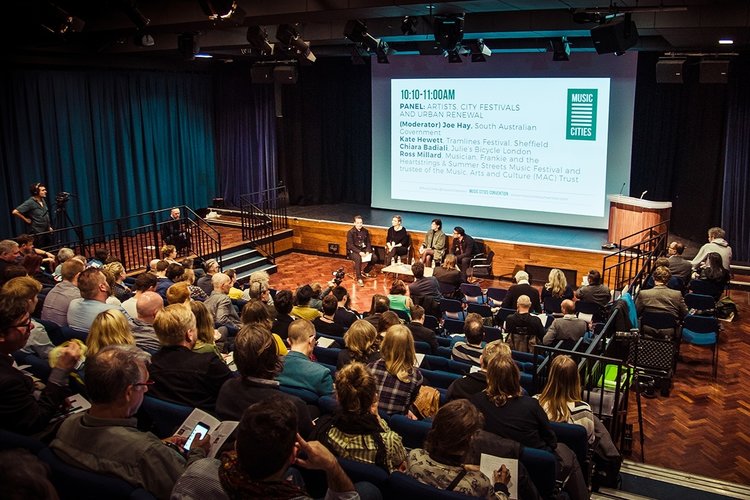Music tourism, night mayor among key topics at Music Cities Convention

Before Melbourne co-hosted the first Music Cities Convention in the southern hemisphere last week, Music Victoria CEO Patrick Donovan told TMN he was hoping for one significant outcome – that Victoria’s policymakers attending the sold-out event would be inspired to introduce some of the initiatives outlined by the 40 speakers.
Or, at least, the government officials and academics would be aware of the ideas and be amenable when the local music industry campaigned for them in the future.
Of the many programs discussed over the two-day convention, a greater focus on music tourism and the introduction of a night mayor for Melbourne were two stand-out topics, particularly due to the fact that realising the economic and cultural role of music tourism in this country is still in its infancy.
During a panel on music, tourism and impact on musicians, Visit Victoria CEO Peter Bingeman said that “music plays a quintessential role” in attracting 24.7 million tourists (overseas and rest of Australia) to Victoria a year.
Visit Victoria has a target of a $36.5 billion spend by visitors to all events by 2025, which in turn supports 320,700 jobs.
Bingeman believes that the 7,000 music and cultural festivals in the state “are prime reasons why people will travel” and “regional Victoria is an area we (Visit Victoria) will focus on for visitations.”
But Australia is lagging behind in both tourism initiatives as well as reporting on what the music industry adds to the economy.
Overseas, trade body UK Music has been releasing the annual Wish You Were Here reports to show how large and beneficial music tourism is. The last report showed 12.5 million music tourists spent £656 million (A$1.19 billion) on tickets and an average of £850 ($1,550) while in the UK.
Tourism Australia research puts music as the third-highest reason to travel to events in this country, after food and wine. But little real data has come on the music side.
“We’re keen to collect data on regional festivals, to help them get increased funding for aspects as marketing and facilities,” Music Victoria’s Patrick Donovan told TMN.
The major problem in Australia has been the reluctance of ticket agencies to provide data on where people are buying tickets for local music events, citing privacy concerns.
Judging from delegates’ feedback, the idea of a Night Mayor for Melbourne is a distinct possibility, given how simple it can be to achieve a vibrant nighttime economy. It’s even popped up as an issue in the current race for City of Melbourne’s Lord Mayor role.
night mayor for Florida’s city of Orlando Dominique Greco Ryan, outlined how she worked with businesses, councillors, police and venues to target a younger demographic with a number of initiatives that made them safer and more comfortable.
These included common-sense coordinating with nightclubs, staggered times for closing, increased security and bicycle police patrols, transit hubs to connect clubgoers with a ride home, relaxing laws to increase the number of bars, and a wider range of entertainment options not necessarily based around the copious consumption of alcohol.
Further presentations from current and hopeful Music Cities brought up to speed achievements in Bogota (Columbia), Amsterdam, Chengdu (China), Harare (Zimbabwe) Fort Collins (Colorado, U.S.), Beijing and Hobart.
“How to become a great music society? Build two universities!” quipped one speaker.
Certainly, if there’s a theme to these locations, it’s having an engaged student audience along with good public transport.
Chengdu, the fourth largest city in China, is inspirational in its coordinating of all sectors as it works at establishing the Musical Fun District in the heart of the city.
The hub includes new venues, studios, music management and legal services; new programs for musicians and performing arts; 56 universities (yes, 56!); working at being the country’s food capital and a tourism destination; encouraging trade, and supporting economic development – all ensuring all this works by adding a second international airport and policies that the public transport network remains thriving
The experience in Zimbabwe’s capital Harare was the other side of the spectrum.
An entertaining presentation of Farai Monroe, who heads the Magamba Network, explained how the city of 2 million has a thriving nightlife and the reputation of being “a city that never sleeps”.
But despite a politically polarised system and an economy in decline, and policies where staging a festival needs clearances from no less than six different agencies (and paying 5% of predicted revenues upfront), they’re lobbying the government for a music policy with local quotas and less regulations.
Melbourne marking the first Music Cities meet in the southern hemisphere proved even more significant, with UK founder Sound Diplomacy’s CEO Shain Shapiro ensuring the continuing presence of Asian cities.
The discussion included music policies in Indonesia, Singapore and Mumbai, the role of international students, and how the Fukuoka Music Month in Japan works together across tourism, industry development and economic regeneration.
It wasn’t all bad news for Australia’s contingent at the gathering, with Helen Marcou of SLAM (Save Live Australian Music) kicking off the conference with how 20,000 people marching through the streets in 2010 protesting the closure of venues panicked the government of the day into talks with the music industry.
“We learnt very quickly that in an election year, change can happen fast,” Marcou stated.
There were also lessons to be learned for the overseas visitors.
Barrister and guitarist Nick Tweedie SC, one of the architects of Victoria’s agent of change, explained how it would work as a win-win situation for all cities around the world.
Melbourne academics and executives joined with overseas delegates to explain the successful way cultural policies have impacted on music policies; how developers and landowners are starting to influence music policy; the value of music; and what constituted high priorities for the city’s music policies.

































